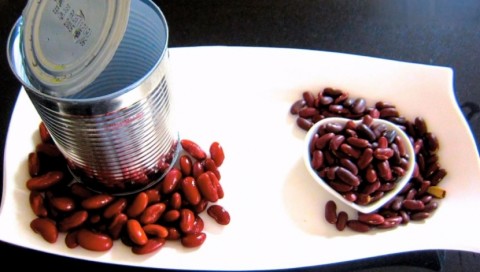DrCarney.com Blog
Is There a Difference Between Canned and Cooked Beans?
My Starch-Smart® System recommends eating a serving of beans twice a day. Does it get tiresome? Not at all! Beans come in so many varieties; they can be prepared and enjoyed in so many different ways! There are garbanzos, pintos, black beans, adzuki, and mayocoba--to mention just a few--and each one has its own flavor profile. Beans can top a salad, form the base of delicious soups, and are a main feature in meat-free burgers and loaves. They can be served hot or cold, whole or mashed, drained or in their own broth.
Every ethnicity and region of the world offers us a new way to love legumes. Mexico gives us burritos and tostadas. Indian dal (lentils) is a wonderful comfort food. Italians are famous for pasta e fagioli. Creole cooking serves up black-eyed peas. The Middle East contributes hummus and falafels. New Englanders love their baked beans. And what would an Asian stir-fry be without sprouted mung beans? If that's not enough variety, green peas, tofu, and Soy Curls are bean-based ways to mix it up when the menu feels boring.
But what about the time it takes to cook beans? Can we instead use canned beans to create this cornucopia of bean cuisine? Yes! According to a study that compares both the cost and the nutrient density of canned versus home-cooked beans, canned beans are a good option for obtaining the nutrition legumes offer (although canned beans cost about $.20 more per half-cup serving than home-cooked beans). The data shows that beans cooked at home do have a better nutrient profile than canned beans, but the gap narrows if the broth from the canned beans is drained off. Draining canned beans removes 45-50% of the sodium content of canned beans. The researchers believe that the high amount of sodium added to most canned beans is to blame for damaging an otherwise excellent source of nutrition.
Since sodium is the major problem with canned beans, the best option is to purchase beans without added salt when the ease of canned beans fits best with our busy schedule. We can check the ingredient list on the back of the label to see if any salt was added during processing. Buying "no salt added" canned beans also allows us to use the nutrient-laden broth the beans were cooked in while enjoying the convenience of canned beans. Dr. Michael Greger does a wonderful job explaining this in greater detail in his two-minute video below.
For additional information:
(1) Can Two Tools Make Diet Change Easy?
(2) Which Beans Contain the Most Antioxidants?
(3) Beans: the Ideal Carbohydrate
(4) Can Eating Beans Inhibit Cancer Cell Growth?
(5) Can Eating Beans Promote Longevity?
(6) McDougall Made Easy: Practical Health Lessons, Cooking Demonstrations
Image Credit - NutritionFacts.org
Video Credit - Canned Beans or Cooked Beans? NutritionFacts.org
Michael Greger MD Links
Scroll Down Page to Leave Comments

What Have You Got to Lose?
Fight the Obesity Epidemic! We provide Starch-Smart Support through our Helpful Sharing Community, Discussion Forums, and Blogging Platform.
When you subscribe to the blog, we will send you an e-mail when there are new updates on the site so you wouldn't miss them.




